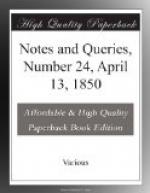“My name is Ormond; have you
not heard of me?
For I have lately forsaken my own counterie;
I fought for my life, and they plundered my estate,
For being so loyal to Queen Anne the great.
Queen Anne’s darling, and cavalier’s
delight,
And the Presbyterian crew, they shall never have
their flight.
I am afraid of my calendry; my monasteries are all
sold,
And my subjects are bartered for the sake of English
gold.
* * * * *
* * * * *
But, as I am Ormond, I vow and declare,
I’ll curb the heartless Whigs of their wigs,
never fear.”
I do not quote the versions given in the Athenaeum, but, on a comparison, it will be seen that they all must have been derived from the same original.
The success of your queries concerning the Duke of Monmouth impel me to propose a few concerning the almost as unfortunate, and nearly as celebrated, second Duke of Ormonde. Many scraps of traditionary lore relative to the latter nobleman must linger in and about London, where he was the idol of the populace, as well as the leader of what we should now call the “legitimist” party.
With your leave. I shall therefore propose the following Queries, viz.:—
1. Who was the author of the anonymous life of the second Duke of Ormonde, published in one volume octavo, some years after his attainder?
2. Was the ballad, of which the above is a fragment, printed at the time; and if so, does it exist?
3. What pamphlets, ballads, or fugitive pieces, were issued from the press, or privately printed, on the occasion of the Duke’s flight and subsequent attainder?
4. Does any contemporary writer mention facts or incidents relative to the matter in question, between the period of the accession of George I., and the Duke’s final departure from his residence at Richmond?
5. Does any traditionary or unpublished information on the subject exist in or about London or Richmond.
JAMES GRAVES.
Kilkenny.
* * * * *
MAYORS.—WHAT IS THEIR CORRECT PREFIX?
I wish to ask, of any of your numerous readers, what may be considered the most proper official prefix for Mayors, whether Right Worshipful or Worshipful? Opinions, I find, differ upon the subject. In the Secretary’s Guide, 5th ed. p. 95. it is said that Mayors are Right Worshipful; the late Mr. Beltz, Lancaster Herald, was of opinion that they were Worshipful only; and Mr. Dod, the author of a work on Precedence, &c., in answer to an inquiry on the point, thought that Mayors of cities were Right Worshipful, and those of towns were only Worshipful. With due deference, however, I am rather inclined to think that all Mayors, whether of cities, or of towns, ought properly to be styled “the Right Worshipful” for the following reason:—all Magistrates are Worshipful,




